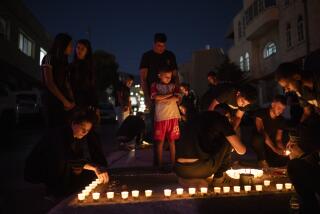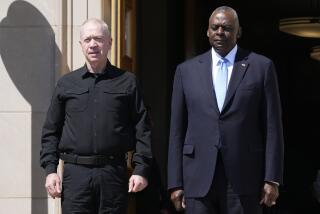No Haiti Invasion Before September, Officials Say
- Share via
PORT-AU-PRINCE, Haiti — Despite a steady drumbeat of threats aimed at frightening Haitian military leaders out of power, the Clinton Administration has set aside any plan for armed intervention here until September at the earliest, U.S. and foreign officials said Tuesday.
The main reason is practical, the officials said: The U.N. force that would be needed to provide order on the island after U.S. troops came ashore will not be ready before the fall.
At the same time, Administration officials noted, Democratic leaders in Congress have asked President Clinton to hold off, expressing fears that the U.S. public is not yet convinced that an invasion is justified.
“I don’t think we’re talking months,” a senior U.S. official said when asked how long the option of military action was being delayed, “but weeks, sure.” Asked if that meant that no invasion was likely before September, he nodded affirmatively.
In Washington, a State Department official involved in Haiti policy said it is becoming clear that no military action would be launched in August. “I don’t think we’re moving that fast,” he said.
And in Jerusalem, Secretary of State Warren Christopher said he is willing to wait for some time before recommending an invasion.
“I think we need to see if the sanctions won’t work,” Christopher said. “The new, enhanced sanctions have only been in effect for a limited period of time. Clearly nobody thinks the use of force is the most attractive option. . . . It may come to that, but the President has not made that decision. He is continuing to go forward with the (sanctions), trying to put the maximum amount of pressure on the illegal government.”
The officials’ estimates conflicted with the Administration’s own public threats against the regime of Lt. Gen. Raoul Cedras, the military leader who overthrew Haiti’s elected president, Jean-Bertrand Aristide, in 1991.
Only a week ago, in Berlin, Clinton said the Cedras regime’s continued existence is intolerable. “We have got to bring an end to this,” he declared. But even while he is keeping the military option on the table, Clinton still hopes that Cedras will decide to leave without an armed confrontation, the officials said.
Diplomats in the Haitian capital said the main factor delaying military action is the inability of the United States and its key allies to assemble an international force to handle peacekeeping duties after any invasion.
A U.S. diplomat said there are three crucial problems in forming the force, which could include more than 15,000 troops and civilian experts--”finance, mandate and command and control”--meaning the countries involved in organizing the plan have not settled on how to pay for the force, what it is supposed to achieve and who would run the operation.
Those are major obstacles, said a diplomat from a country that has been asked to contribute to the force. “Those three elements are the defining ones. Without all three in place, there is no international force.”
He added that his government’s assessment is that it will take “two or three months” before the international unit is in place. “My government will not take part as things stand now,” he said. He added that “we fully expect the issues to be settled.”
The U.S. diplomat, looking distressed, agreed that “nothing will happen (regarding armed action) until all three” disagreements are resolved.
Part of the problem is a change in the design of the international force. The original idea, which grew from negotiations between the Haitian military and Aristide in 1993, was for a small U.N. force that would retrain the Haitian military and police as part of a settlement.
But the force now under consideration would be a much larger, U.S.-led operation that would maintain order, guarantee the safety of the Aristide government and the military and assume some degree of civil control.
That shift is a major factor in the difficulty of putting together the force, according to other diplomats, because it costs far more and changes the role from one essentially of trainer to occupier.
Last week, the U.S. ambassador to the United Nations, Madeleine Albright, said a dozen or so nations, including some in Latin America and the Caribbean, had agreed to join the United States in a peacekeeping force.
But diplomats interviewed Tuesday stressed that those countries’ commitments are tentative. The nations include Argentina, Barbados, Belize, Brazil, Canada, Chile, France, Guyana, Jamaica, Panama, Suriname and Trinidad.
Domestic U.S. politics are also a consideration in any possible Haiti actions, according to officials here and in Washington. Democratic leaders in Congress have warned Clinton that the public is not ready for military intervention and urged him to give economic sanctions longer to work.
Last week, Senate Democratic leader George J. Mitchell (D-Me.), Senate Armed Forces Committee Chairman Sam Nunn (D-Ga.) and House Foreign Affairs Committee Chairman Lee H. Hamilton (D-Ind.) all weighed in publicly against an invasion.
Administration officials said they took the legislators’ views seriously but refused to say whether they had pushed back the possible time frame for military action.
Anthony Lake, Clinton’s national security adviser, acknowledged Tuesday that the congressional leaders had urged caution and said the Administration promised to “consult” with Congress further before an invasion is launched. He suggested that Clinton would expect the nation to rally behind the U.S. forces.
“If the President were to order a military operation in Haiti, he would certainly go to some lengths to explain to the American people with precision what our interests are, what the mission is . . . (and) when we expect to accomplish it,” he said.
Clinton faces a political dilemma in considering the timing of an invasion of Haiti, but it is long-term rather than short-term. Administration officials and military officers said a well-planned U.S. invasion would take a few days, at most, to overwhelm Haiti’s lightly armed 7,000-member army. The problem, they said, would come afterward--when U.S. and allied troops try to restore order.
Supporters of the military regime already have threatened to go underground in the face of an invasion so they can launch terrorist attacks against occupation troops. Any peacekeeping operation would require “many months,” Christopher warned earlier this month.
Freed reported from Port-au-Prince and McManus from Washington.
More to Read
Sign up for Essential California
The most important California stories and recommendations in your inbox every morning.
You may occasionally receive promotional content from the Los Angeles Times.














